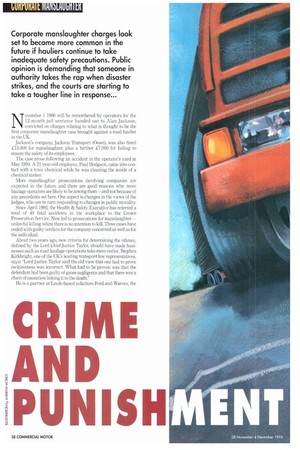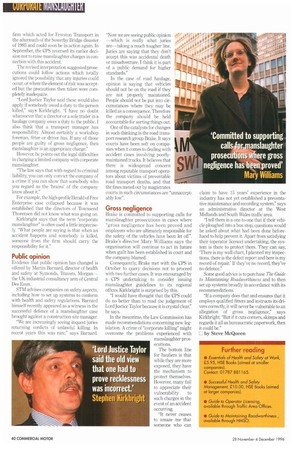CRIPA AND PUNI SH
Page 152

Page 154

If you've noticed an error in this article please click here to report it so we can fix it.
firm which acted for Fewston "fransport in the aftermath of the Sowerby Bridge disaster of 1993 and could soon be in action again. In September, the CPS reversed its earlier decision not to raise manslaughter charges in connection with this accident.
The revised interpretation suggested prosecutions could follow actions which totally ignored the possibility that any injuries could occur, or where the element of risk was accepted but the precautions then taken were completely inadequate.
"Lord Justice Taylor said these would also apply if somebody owed a duty to the person killed," says Kirkbright. "I have no doubt whatsoever that a director or a sole trader in a haulage company owes a duty to the public. I also think that a transport manager has responsibility. Almost certainly a workshop foreman, fitter or driver has. If any of those people are guilty of gross negligence, then manslaughter is an appropriate charge."
However, he points out the legal difficulties in charging a limited company with corporate manslaughter.
"The law says that with regard to criminal liability, you can only convict the company of a crime if you can show that somebody who you regard as the 'brains' of the company knew about it."
For example, the high-profile Herald of Free Enterprise case collapsed because it was established that the directors of Townsend Thorensen did not know what was going on.
Kirkbright says that the term "corporate manslaughter" is often used a little imprecisely. "What people are saying is that when an accident happens and somebody is killed, someone from the firm should carry the responsibility for it."
Evidence that public opinion has changed is offered by Martin Barnard, director of health and safety at Symonds, Travers, Morgan— the UK industrial consultancy arm of Central Des Eaux.
STM advises companies on safety aspects, including how to set up systems to conform with health and safety regulations. Barnard himself recently appeared as a witness in the successful defence of a manslaughter case brought against a construction site manager.
"We are increasingly seeing inquest juries returning verdicts of unlawful killing. In recent years this was rare," says Barnard. "Now we are seeing public opinion
which is really what juries are—taking a much tougher line. Juries are saying that they don't accept this was accidental death or misadventure. [think it is part of a public demand for higher standards."
In the case of road haulage, opinion is saying that vehicles should not be on the road if they are not properly maintained. People should not be put into circumstances where they may be killed as a consequence. Therefore the company should be held accountable for sorting things out.
One of the catalysts for changes in such thinking is the road transport research group Brake. It says courts have been soft on companies when it comes to dealing with accident cases involving poorlymaintained trucks. It believes that there is widespread concern among reputable transport operators about victims of preventable road transport deaths, and that the fines meted out by magistrates courts in such circumstances are "unnacceptably low".
Brake is committed to supporting calls for manslaughter prosecutions in cases where "gross negligence has been proved and employers who are ultimately responsible for the safety of the vehicles have been let off". Brake's director Mary Williams says the organisation will continue to act in future when guilt has been established in court and the company blamed.
Consequently. Brake met with the CPS in October to query decisions not to proceed with two further cases. It was encouraged by a CPS undertaking to consider issuing manslaughter guidelines to its regional offices. Kirkbright is surprised by this.
"I would have thought that the CPS could do no better than to read the judgement of Lord Justice Taylor because it is crystal clear," he says.
In the meantime, the Law Commission has made recommendations concerning new legislation. A crime of "corporate killing" might overcome the problems experienced with manslaughter prosecutions.
The bottom line for hauliers is that while they are more exposed, they have the mechanism to protect themselves. However, many fail to appreciate their
vulnerability to such charges in the event of an accident occurring.
"It never ceases to amaze me that someone who can claim to have 15 years' experience in the industry has not yet established a preventative maintenance and recording system," says an administrative director at the West Midlands and South Wales traffic area.
"I tell them in a one-to-one that if their vehicle ploughed into a bus stop, questions would be asked about what had been done beforehand to help prevent it. Apart from satisfying their (operator licence) undertaking, the system is there to protect them. They can say, 'There is my wall chart, I planned my inspections, there is the defect report and here is my record of repair.' If they've no record, they've no defence."
Some good advice is to purchase The Guide to Maintaining Roadworthiness and to then set up systems broadly in accordance with its recommendations,
"If a company does that and ensures that it employs qualified fitters and instructs its drivers correctly, it will never be vulnerable to an allegation of gross negligence," says Kirkbright. "But if it cuts corners, skimps and regards it all as bureaucratic paperwork, then it could be."
L by Steve McQueen




















































































































































































































